Andy Himmel’s new BOMBA Tacos & Rum adds Latin spice to Greater Cleveland cuisine
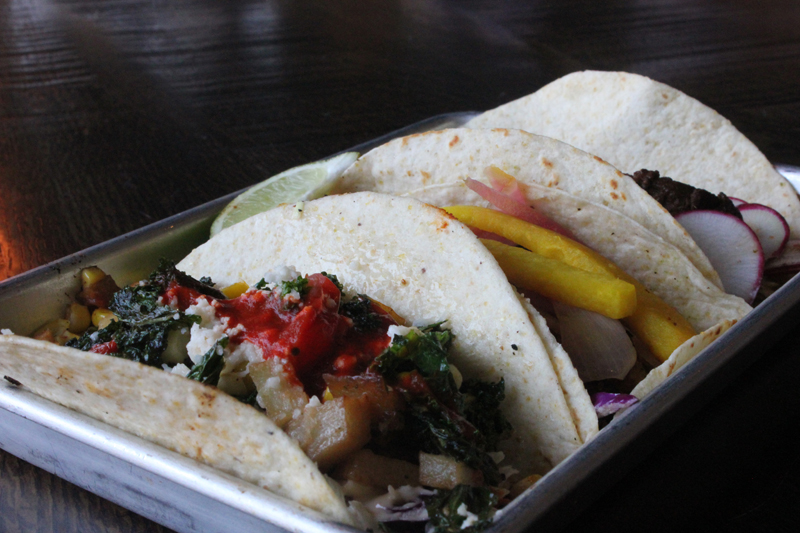
From left, the Charred Kale & Corn taco with potatoes, grape tomatoes, queso fresco, roasted garlic aioli and cholua; the Blackened Fish taco with pickled onion, pineapple slaw and cilantro aioli; and the Lamb Barbacoa taco with radish and tomatillo salsa.
Story by Carlo Wolff
Photography by Michael C. Butz
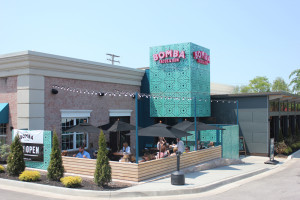
BOMBA’s Rocky River storefront.
Bite into the braised beef taco at BOMBA Tacos & Rum to see why BOMBA creator Andy Himmel likes the dish so much. It’s a symphony of flavors, from the smoky beef to the fruity pickled jalapenos and the juicy pepper aioli that gives it slide and crunch. A pick-me-up of substance and style, it’s also hot, befitting the Latin-American cuisine it’s based on. It goes down easy, a slow burn its aftermath.
That taco, a downsized version of the Braised Beef Ropa Vieja “large plate,” is one of 20 available at The Paladar Group’s first BOMBA Tacos & Rum, a “premium casual” restaurant on Detroit Avenue in Rocky River.
Whether this BOMBA is the start of a new brand or simply an extension of Paladar Latin Kitchen & Rum Bar, The Paladar Group’s original outpost at Eton Chagrin Boulevard, remains to be seen. In any case, it’s a distillation of the swankier Paladar in menu, atmosphere and convenience.
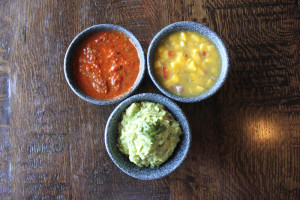
Clockwise from top left: Fire-Roasted Tomato salsa, Caribbean Mango salsa and a traditional guacamole.
Judging from a visit to BOMBA, which feels seasoned though it’s only been open since mid-April, The Paladar Group has another hit on its hands. The outdoor patio was nicely populated one afternoon in late May, and inside, busy bartenders were pouring drinks, many based on the sophisticated array of rums that is a signature of Paladar Group restaurants.
Himmel, who is 34, was to the restaurant business born. His father, Marty, owned and operated The Boarding House, a long-gone restaurant in University Circle, and, after earning a degree in finance at The Ohio State University, he launched Boulevard Blue, a restaurant in Cleveland’s Larchmere neighborhood off Shaker Square in 2004. Three years later, he established Paladar, the Woodmere restaurant that serves as incubator for BOMBA. Boulevard Blue, which also was known as a jazz club, closed in 2009, shortly after Himmel turned his attention full time to Paladar.
Now he’s training his sights on BOMBA.
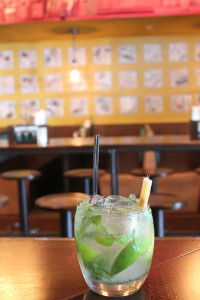
BOMBA’s traditional mojito, consisting of white rum, lime, mint and sugar.
“It’s our first new concept in a long time,” says Himmel, who living in Orange with his wife and two young children feels deeply connected to Cleveland’s Jewish community. “It’s been energizing. Not that I was uninterested before, but this kind of adds a new dimension. We’ve learned a lot about the benefits of simplicity, not trying to be everything to anyone, and I think we’re bringing some of that back to Paladar, too.”
Named after a heavily rhythmic style of Puerto Rican music and rum casks repurposed as drums, the 4,500-square-foot BOMBA is largely earth-toned, with exposed industrial ceilings, sturdy, low-key furniture and artfully deployed dark hues befitting the smoke at the heart of its cuisine. Lining narrow racks above the big, rectangular bar are the many varieties of rums Paladar Group eateries are known for.
Why the focus on rum?
“It really started as a differentiation point with the first concept, Paladar,” Himmel says. “A big part of our focus is Cuba and the Caribbean, both in terms of the cuisine and the culture, and certainly rum is the main spirit of that region.
“Part of our brand is the thrill of discovery, introducing Latin flavors and rum to people who really haven’t been exposed to that. … We were excited about rum because it’s such a diverse spirit. For bourbon lovers and whiskey lovers, there are some great rums we transition them to.”
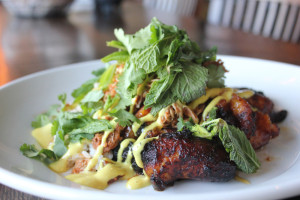
The Slow Smoked Pulled Chicken with rice pilaf, Salvadorian slaw, plaintains and aji pepper aioli.
One type of rum he’d like to be able to offer his guests is Cuban rum. Himmel says he’ll bring in the storied Havana Club label as soon as the U.S. embargo on Cuba is finally lifted. That can’t be too soon, he says, adding he’s never been to that off-limits island 90 miles south of Miami.
The BOMBA cuisine that pairs with the rum is based on exceptional, standalone restaurants Himmel and his crew have visited, like a small New York eatery serving a taco with a pineapple flavor.
“It’s great to find places that do certain things really well,” he says.
“In terms of inspiration for this cuisine, we went into Miami and New York, and got into some of the really, really great taco concepts that exist,” Himmel says. “A lot of them are single-unit, smaller ones that have unbelievable food. We spent a lot of time learning about those restaurants, took that and compared that to what’s been working well at Paladar.”
Perhaps, he suggests, BOMBA is on the tip of a “better tacos movement,” similar to the “better burger movement” exemplified by, he says, B Spot and Flip Side restaurants.
Like those, BOMBA is “premium casual,” aimed at customers who want some of the formality of a full-service restaurant but also crave an atmosphere – and cuisine – that feel instantly comfortable.
“To us, it’s a concept,” he says. “It still has elements of full service, but it feels more like you’re dining at a bar table as opposed to sitting in a dining room.”
Today’s adventurous diners “are looking for less commitment,” he says.
At BOMBA, B Spot and Flip Side, “it’s first come, first serve, (at) an easy place to go any day of the week. It means different things to different people; I think people default to what they consider simple.”
Himmel and his investors own six restaurants: the Paladar at Eton; three in suburban Washington, D.C.; one in Annapolis, Md.; one in Hallandale Beach, Fla.; and the BOMBA in Rocky River. A seventh Paladar is set to open in the Philadelphia area next spring.
If the growth of the past eight years is an evolution, what Paladar has evolved to is tweaking, Himmel says. Fine-tuning and adapting are critical.
Over the years, the group has brought “unbelievably talented chefs and managers” onto its staff, which numbers about 500, including part-timers, Himmel says.
These executives – there are eight to 10 managers at every Paladar restaurant – are world travelers who add “years of experience cooking this kind of food to our company,” he says. “It also forced us to get out to other markets, and taking everything together, it just added more depth and layers to what we were doing.”
While refining the menu is critical to The Paladar Group, what really turns Himmel on is getting the business “to the next level.”
“It takes us at least six months to figure out how to really operate, and get ourselves on stable footing,” he says. “None of our restaurants are identical. As a company, we’re constantly looking at what is the next step? Where does the menu go from here? How do we make our systems better? Every restaurant is constantly part of that process.” JS
Originally published June 26, 2015.
